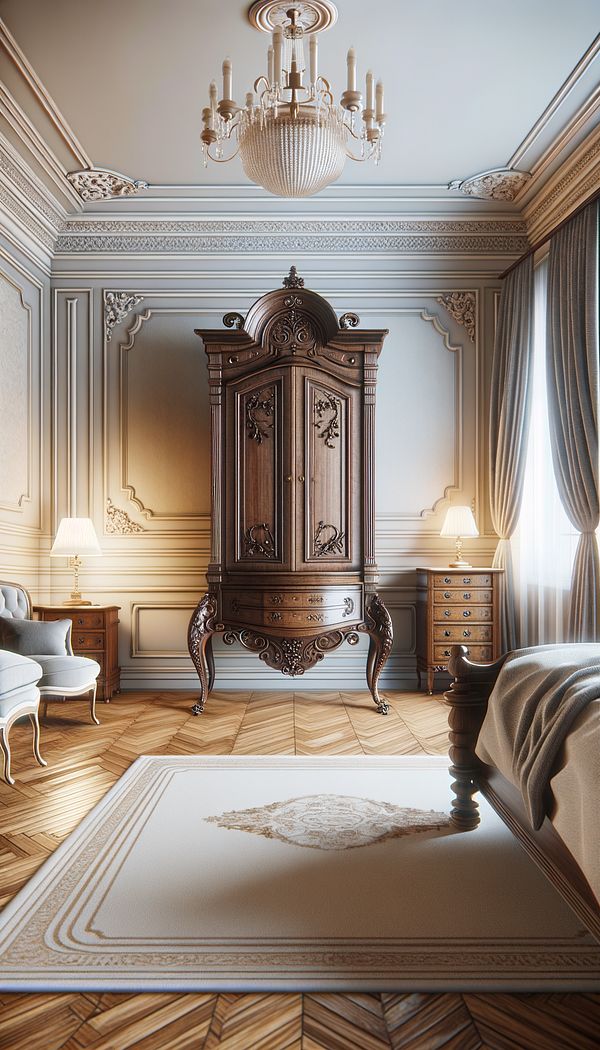What is a Highboy?
A tall chest of drawers, often divided into two sections and equipped with legs.
Description
A highboy is a piece of furniture that holds a distinguished place in the realm of traditional and antique interiors. Its construction is typically characterized by a tall, vertical frame that combines drawers of varying sizes, often in two sections, with the lower half usually resting on four legs. These legs may be elegantly carved or styled in the manner of particular historical periods, such as the Queen Anne or Chippendale styles.
The upper section of a highboy is frequently crowned with an ornate pediment, enhancing its stately appearance. This structure makes it not only a practical storage solution but also a decorative element capable of anchoring a room's aesthetic. Historically, highboys were used to store clothing and personal items, taking advantage of vertical space in bedrooms and dressing rooms.
Today, highboys retain their functional role but also serve as a testament to craftsmanship and design evolution. They are often sought after by collectors and enthusiasts of antique furniture, as well as being employed in classical interior design schemes.
Usage
In a classically styled bedroom, a highboy may be situated against a wall, serving both as an elegant focal point and a practical storage unit. Antique highboys are particularly valued in spaces that aim to capture the essence of historical periods, such as colonial or early American interiors. Additionally, modern interpretations of the highboy can be found in contemporary designs, where they provide a nod to traditional form while incorporating modern materials and finishes.
FAQs
-
Is there a difference between a highboy and a tallboy?
Yes, while both are tall chests of drawers, a highboy typically consists of two separated sections and stands on legs, whereas a tallboy is usually a single, tall piece without a distinct break between its upper and lower parts.
-
Can highboys be found in modern interior designs?
Yes, highboys can be incorporated into modern interior designs either through the use of antique pieces for a touch of classic elegance or through modern adaptations of the highboy that reflect contemporary styles and materials.
-
How should you care for an antique highboy?
Caring for an antique highboy involves regular dusting with a soft cloth, avoiding exposure to direct sunlight and extreme temperatures, and occasional polishing with a product suitable for antique wood. It's also advisable to seek professional advice for any repairs or restoration.
-
Are highboys only suitable for bedrooms?
No, while traditionally used in bedrooms, highboys can also enhance living rooms, dining rooms, or entryways, serving as storage and decorative pieces.
-
What makes highboys expensive?
Highboys can be expensive due to their intricate designs, quality of craftsmanship, historical value, and the materials used, especially in antique pieces.
-
How to identify an original highboy?
Identifying an original highboy involves examining the craftsmanship, materials, hardware, and stylistic details typical of the period it represents, as well as consulting with an antique furniture expert.
Practical Application
When considering a highboy for your interior, assess both the style and functionality it will bring to your space. Ensure its dimensions fit comfortably within your room without overpowering other elements. For a historical or sophisticated touch, select an antique or traditionally styled highboy. For modern settings, look for sleek designs with minimal decoration. Remember, while highboys are attractive, they need to remain accessible and functional to truly enhance your living space.
-
Architectural Elements199 articles
-
Design Styles478 articles
-
Furniture Types599 articles
-
Decorative Objects240 articles
-
Historical Periods & Movements150 articles
-
SpringsSprings are components used in furniture construction for providing support and comfort.
-
Fleur De LisA stylized lily or iris, used as a decorative design or symbol.
-
Parsons LegA simplistic, square, or rectangular support typically found on tables and chairs.
-
Farthingale ChairA Farthingale Chair is a type of chair with a wide seat and usually no armrests, designed to accommodate the wide skirts of women's dresses in the 16th to 17th centuries.
-
Barrel VaultA barrel vault, also known as a tunnel vault or a wagon vault, is an architectural element characterized by its semi-cylindrical shape.
